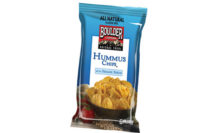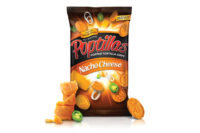Puttin’ on the Chips
By Pan Demetrakakes
Ubiquity Brands’ new warehouse and upgraded material handling enable a change in the delivery model for an iconic Midwestern salty snacks brand called Jays.
John Weller has managed the Jays Foods salty snack plant on Chicago’s South Side for only about six months, but he knows about Chicago-based food icons. He spent years working for Wm. Wrigley Jr. Co. Ask Weller about the logistical differences between gum and potato chips, and you get a where-do-I-begin laugh.
“Our shelf life is weeks instead of months,” he says. “We cube out before we weigh out in this business. In the gum business, you weigh out before you cube out.”
Meeting logistical challenges is the motivation behind the sweeping improvements that parent company Ubiquity Brands has made at the Jays Foods plant. Ubiquity acquired and refurbished a warehouse across from the production facility about 18 months ago.
The new warehouse, referred to at Jays Foods simply as “Mega,” is the key to a revamping of the distribution system for Jays snacks that changes the division’s entire business model. The improvements will make delivery faster and more flexible. It also enables Ubiquity to service both big and small customers better. Moreover, it allows Jays Foods to initiate nationwide distribution for some brands.
The Chicago facility produces 30,000 to 35,000 cases a day of potato chips, kettle chips and ready-to-eat popcorn. The products break down into more than 200 stock-keeping units (SKUs), with another 100 SKUs produced elsewhere, but stored and shipped from Mega.
Warehouses Dismantled
Before the acquisition and refurbishing of Mega, Jays Foods’ distribution was based almost entirely on company-owned warehouses throughout an eight-state area in the upper Midwest. Semi-trailer trucks would bring loads of snacks from the Chicago facility to the warehouses, where the pallet loads would be broken down and re-picked for individual retail orders, shipped on route trucks.
Mega, with about seven days’ worth and five multi-line robotic palletizers, allows individual store orders to be assembled on-site. This enables Ubiquity to deliver Jays products in one of three ways:
1. Semis can go from Mega to the warehouses of big customers like supermarket or other retail chains.
2. Semis can take products to Jays Foods’ warehouses that have been converted to cross-docking facilities, and be transferred immediately to route trucks for direct store delivery (DSD). This is the usual mode of distribution for small and mid-sized customers in the territory north and west of the plant.
3. Semis can take products directly to distributors and retailers in the territory east and south of the plant — even as far south as Texas.
Not only does this more efficient distribution allow Ubiquity to service customers better, but it’s also the keystone for a bold leap onto the national stage. Krunchers! — the division’s line of “kettle-cooked” (that is, batch-cooked) potato chips — is set to become the first Jays Foods’ product in nationwide retail distribution. Krunchers! already is in foodservice nationwide, thanks to an alliance Ubiquity made a couple of years ago with a national sandwich chain. That company offers special 1-oz. bags of Krunchers! as a side for the sandwiches it sells in its 740-plus quick-service restaurants. Ubiquity also plans to put O-KE-DOKE, its line of ready-to-eat popcorn, into national distribution later this year.
Faster delivery is the second part of a two-pronged strategy for nationwide distribution of Krunchers! and O-KE-DOKE. The first part is extending the shelf life of those products. For Krunchers!, this will be accomplished partly through nitrogen flushing during filling. This company already gas flushes bags of Krunchers! that are distributed nationally and will soon be done for regionally distributed products as well.
That, plus what Weller calls “oil management” — carefully monitoring, filtering and supplanting the frying oil — will extend the Krunchers! shelf life from 14 to 26 weeks. The nitrogen-flushing is done on form-fill-seal equipment from CMD, fed by combination weigh scales from Ishida. Other form-fill-seal equipment comes from Hayssen Packaging Technologies and Kliklok-Woodman.
O-KE-DOKE will have its shelf life extended from weeks to months through a combination of oil management and new packaging.
The production area for potato chips comprises batch fryers — for Krunchers! — and continuous ones. (Continuous fryers have a much higher throughput than batch ones.) The plant receives truckloads of potatoes a day, at about 50,000 lbs. per truckload.
After the chips are fried, they pass through metal detectors from Safeline Metal Detection. They’re inspected by vision systems from Best USA or Key Technology that launch them into a gap, look for discolorations or other flaws, and remove offending chips from the stream with air jets.
They then go to accumulation bins that can hold several minutes’ worth of production. If the baggers temporarily fall behind, the bins enable the fryers to keep operating, which is one of the keys to good oil management.
The chips are bagged in form-fill-seal systems, using film from Bryce Corp., and hand packed into cases. The products pass through an Eagle X-ray inspection system from Smiths Detection, which can detect both cases with missing bags and contaminants within individual bags. Print-and-apply labels are hand-applied to the cases.
The products next travel on a 600-ft. long overland tunnel that has a belt conveyor and a walkway. At peak periods, about 30 cases per minute travel through the tunnel.
By instituting the delivery-model changes that Mega made possible, Jays Foods managed to take 20% of inventory out of its system. That means the chips and popcorn spend less time sitting around — and when you’re dealing with products that have a limited shelf life, every day counts.
The 60,000-sq.-ft. warehouse holds dips, salsa and other items that Ubiquity buys sells to small retailers and distributors who want to cut down on their deliveries.
20 SKUS at Once
The warehouse’s range of inventory varies by customer. For large foodservice customers or major retail chains, Jays Foods tries to stock up to a dozen days’ worth of inventory to accommodate surges in demand. For direct-store-delivery customers, the range is four to five days.
The five robotic palletizers from Fanuc Robotics accommodate four lines each, meaning the plant can run 20 SKUs at any one time. Optical scanners read the bar codes on the incoming cases and route them to the proper palletizer. If a given palletizing area is full, the system can route a case around for another pass.
Once a pallet is full, a transfer cart on tracks that run beside the palletizers arrives to pick it up and take it to one of two stretch wrappers from M.J. Maillis Group. Because the snacks are so light, the pallet loads can reach upwards of 10 ft. The stretch wrappers save not only time, but film. Plant manager Weller estimates that one roll of stretch-wrap film is enough for 150 pallets, more than double what the yield would be for hand-wrapping.
Forklift drivers take the pallet loads to their storage positions and, eventually, to one of eight semi-trailer bays or 18 bays for route trucks. Currently, the instructions for the forklift drivers all are worked out by hand. In June, Ubiquity plans to implement an SAP enterprise resource planning system that will include a warehouse management module. The SAP system’s functions will include giving instructions to forklift drivers and coordinating inventory with production and pending orders.
“There are well over 100 people here that are going to have to learn a whole new skill set,” Weller observes. SFWB
Editor’s Note: This article originally ran in Food & Drug Packaging, a sister publication to Snack Food & Wholesale Bakery. Pan Demetrakakes is executive editor of F&D Packaging.
At a Glance
Company: Jays Foods Inc., a unit of Ubiquity Brands
Location: Chicago
Plant Size: 150,000 sq. ft. in production; 60,000 sq. ft. in warehouse
Employees: 280 in production, 85 in warehouse
Operating hours: Three shifts per day, five to six days per week
Product lines handled: Jays and Krunchers! potato chips, O-KE-DOKE popcorn
Package types: Bags, paperboard cartons
No. of packaging lines: Five
Location: Chicago
Plant Size: 150,000 sq. ft. in production; 60,000 sq. ft. in warehouse
Employees: 280 in production, 85 in warehouse
Operating hours: Three shifts per day, five to six days per week
Product lines handled: Jays and Krunchers! potato chips, O-KE-DOKE popcorn
Package types: Bags, paperboard cartons
No. of packaging lines: Five




